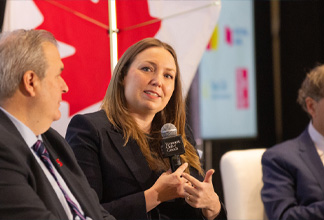Are Avocados the New Latte Factor?
Written by Sylvia Stewart
Published on July 11, 2017
minute read
Share:
The Internet exploded recently over—of all things, get ready for this—avocados. (Luckily, it's mostly a metaphor.)
On one side of the chasm was Australian real-estate mogul Tim Gurner. On the other, a whole generation of money-short millennials who, at least according to Gurner, will never own their own homes because of frivolous spending habits in the form of — here they are again — avocados.
Specifically, "smashed avocado for $19 and four coffees at $4 each," he said.
"The idea, at its most basic, is that small spending-habit changes and resisting daily pleasures/purchases could, over a lifetime, amount to more wealth than you expected."
The premise, of course, doesn't just apply to saving for a down payment for a home. Investing savings goals run the gamut from travel to new vehicles, education to retirement, or really anything an investor deems significant. Setting specific goals can be key in savings success.
The avocado angst is a new indulgence but an old, familiar argument: In recent years, it's been commonly known as the "Latte Factor," as David Bach coined it, but in an older generation, maybe as "a penny saved is a penny earned." The idea, at its most basic, is that small spending-habit changes and resisting daily pleasures/purchases could, over a lifetime, amount to more wealth than you expected.
For believers, it boils down to basic math. Which is where the pre-authorized contributions (PAC) calculator can help out. Say you put aside the $5 a day ($35 a week!) spent on a coffee (latte or otherwise) and a cookie. In 365 days, that'd give you a total of $1,825. The PAC calculator shows that by investing that $35 each week at a hypothetical 6 per cent annual rate of return over 40 years, you could be sitting on more than $300,000. (And that's $5 a day — just imagine what your relocated $19 avocado toast expenditure might do!) Rates of return vary, of course, based on investment styles.
For detractors, the idea isn't as smooth as it appears. Even on Bach's debt diet, $300,000 isn't necessarily the fantasy fortune it seems. Average home prices alone in Canada are expected to reach more than $500,000 this year, up nearly 5 per cent from last year, according to the Canadian Real Estate Association. (Although it's around double that in Toronto and Vancouver). The Canadian University Survey Consortium found the average post-secondary student in Canada graduates with more than $25,000 in debt. Statistics Canada reports more than 13 per cent of Canadians aged 15 to 24 are unemployed — almost twice that of the general population.
Millennials are poor, say millennials, because they can't afford rent these days, let alone $19 smashed avocado toast. Add to that the challenging job economy, and some might say at least let 'em enjoy a latte!
The truest picture likely lies somewhere in the middle of both camps. Certainly small savings do add up, but it's hard to argue that anybody is out their $25,000 real estate down payment (that's 5% down on a $500,000 property) because of produce. (Just for fun though, resist a $1.50 avocado every day, for just 45 years, and you'll have your down payment. Easy peasy!)
Wanna enjoy that creamy avo spread and still save your nickels and dimes? The good news is, the Latte Factor is by no means latte-specific. Here are three ideas that can help move small costs out of your daily life and into your long-term savings:
Bank Fees: When was the last time you scoured your statement for fees? Being aware of your habits means you can ensure you've got the right accounts in place. The Canadian Bankers Association (CBA) offers suggestions such as using low or no-fee accounts if you only have a few transactions each month and maintaining a minimum account balance, which can often mean monthly service fees are waived. Using another institutions bank machine? Those fees can add up. (Although word's getting around on that — the CBA says 75 per cent of bank-machine withdrawals are done by customers at their own bank, meaning no convenience fees kick in.)
Pack Your Lunch: This one's too easy: Avoiding $10 a day on soggy takeout each weekday could save you $50 a week—or around $200 a month. That's lots to top up your grocery bill for a bigger and better (and maybe even healthier) lunch menu.
Cycle or Walk: If you can, skipping a $3-ish transit token (times two to get home) could mean savings of $30 a week (and, assuming you work 50 weeks a year, $1500 a year). A monthly pass might be a savings option, and even better — a walk or bike ride to work might just save you a gym membership too.
Want to see how your own savings can add up? The pre-authorized contributions calculator lets you see how regulator contributions can help get you to your goal.
*The title of this article was changed on July 18 from “Welcome to My Avocado Toast…I Mean Home.”
RBC Direct Investing Inc. and Royal Bank of Canada are separate corporate entities which are affiliated. RBC Direct Investing Inc. is a wholly owned subsidiary of Royal Bank of Canada and is a Member of the Canadian Investment Regulatory Organization and the Canadian Investor Protection Fund. Royal Bank of Canada and certain of its issuers are related to RBC Direct Investing Inc. RBC Direct Investing Inc. does not provide investment advice or recommendations regarding the purchase or sale of any securities. Investors are responsible for their own investment decisions. RBC Direct Investing is a business name used by RBC Direct Investing Inc. ® / ™ Trademark(s) of Royal Bank of Canada. RBC and Royal Bank are registered trademarks of Royal Bank of Canada. Used under licence.
© Royal Bank of Canada 2025.
Any information, opinions or views provided in this document, including hyperlinks to the RBC Direct Investing Inc. website or the websites of its affiliates or third parties, are for your general information only, and are not intended to provide legal, investment, financial, accounting, tax or other professional advice. While information presented is believed to be factual and current, its accuracy is not guaranteed and it should not be regarded as a complete analysis of the subjects discussed. All expressions of opinion reflect the judgment of the author(s) as of the date of publication and are subject to change. No endorsement of any third parties or their advice, opinions, information, products or services is expressly given or implied by RBC Direct Investing Inc. or its affiliates. You should consult with your advisor before taking any action based upon the information contained in this document.
Furthermore, the products, services and securities referred to in this publication are only available in Canada and other jurisdictions where they may be legally offered for sale. Information available on the RBC Direct Investing website is intended for access by residents of Canada only, and should not be accessed from any jurisdiction outside Canada.
Explore More

7 Ways to Get Ahead Financially in 2026
How you might invigorate your finances and put your money to work more intentionally this year
minute read

Economic Outlook: Uncertainty is Here to Stay, So What's Next?
Takeaways from the Economic Club of Canada’s Annual Event
minute read

3 things: Week of December 15
What the Inspired Investor team is watching this week
minute read
Inspired Investor brings you personal stories, timely information and expert insights to empower your investment decisions. Visit About Us to find out more.







